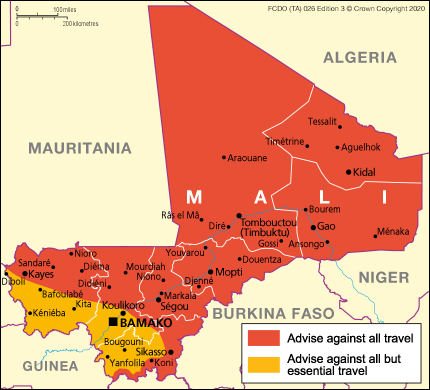Mali
Summary

For security reasons the FCDO advises against all travel to:
- The regions of Tombouctou, Kidal, Gao, Mopti and Segou.
- All areas situated to the north of the line running from Kayes, north of Koulikoro, to Sikasso and Koni, including the towns of Kayes, Segou, Sikasso and Koni.
- Areas west of the border between Mali and Burkina Faso, as far as, and including the towns of Sikasso and Koni.
- Within 20km of the border with Côte d’Ivoire from Koni westwards.
The FCDO advises against all but essential travel to the rest of Mali, including Bamako.
You should avoid all large gatherings. Anti MINUSMA (UN peacekeeping force) demonstrations are planned for 5 August, starting from 2pm at the Palais de la Culture.
On 29 July, the US government issued a security notice ordering orderedordering the departure of non-emergency US government employees and family members due to the heightened risk of terrorist attacks in areas frequented by westerners.
COVID-19 entry restrictions for Mali
Before you travel, check the ‘Entry requirements’ section for Mali’s current entry restrictions and requirements. These may change with little warning. Monitor this advice for the latest updates and stay in contact with your travel provider.
Travelling from and returning to the UK
Check what you must do to travel abroad and return to England, Scotland, Wales or Northern Ireland.
If you plan to pass through another country to return to the UK, check the travel advice for the country you’re transiting.
Terrorists are very likely to try to carry out attacks in Mali, including kidnaps. There is a heightened risk of attack in Bamako. AttacksA couldseries beof indiscriminateattacks andin occurcentral withoutand warning,southern Mali including in placesJuly visited2022 byat foreignersthe Kati military camp just 15km from the centre of Bamako, demonstrate a deteriorating security situation. In July 2022, JNIM made public statements setting out their intention to conduct attacks in Bamako. Attacks could be indiscriminate and largeoccur crowds.without warning. You should be especially vigilant and where possible avoid places frequented by foreigners and large crowds including, diplomatic premises, hotels, restaurants, bars, nightclubs, stadiums, concert halls, shopping areas, markets, national infrastructure, airports and other transport hubs, places of worship and businesses with western interests. Large crowds and foreign, national or local government facilities, including those belonging to the defence and security forces, mayare also belikely ato target.be targets.
You should be vigilant, be alert to announcements, monitor local media and follow the advice of the local authorities. Avoid all large gatherings, including during national day celebrations and public holidays. Large gatherings can also include music festivals, shows, concerts, sporting events and any public marches or demonstrations. You should exercise caution during election periods and take particular care during festivities, and religious and public holiday periods. See Terrorism
During public holidays and festivals, including New Year and Eid celebrations, security measures in Mali can be heightened due to the ongoing threat posed by terrorist organisations. During such periods you should exercise increased vigilance, limit your movements and continue to avoid large gatherings. If you think a particular venue would present a good target for terrorist activities then you should avoid it.
ADue nationwideto statethe ofheightened emergencyrisk wasof putattack in placeBamako, inyou November 2015 and has been extended several times since. You should expect a robust security presence including police patrols and possible police security checks on restaurants and hotels. There are likely to be more vehicle and personal security checks during this time and nobody will be exempt.
Political unrest is an ongoing risk. Regular, large and at times violent protests have taken place in Bamako, resulting in burning of tires, clashes with the police, blockage on the roads and bridges, the deployment of tear gas, and small arms fire. There have previously been reports of several deaths and injuries. You should avoid large gatherings, remain vigilant and monitor local social media/news.
Public demonstrations in and around Bamako have encountered a strong police and security force presence. You should stay away from all political demonstrations and any blockades set up by the police and security forces. Maintain several days’ stock of food and water in case disturbances take place. You can monitor daily developments in English through the BBC World Service (88.9 FM in Bamako).
If you’re planning travel to Mali, find out what you need to know about coronavirus there in the Coronavirus section.
During the COVID-19 pandemic, it is more important than ever to get travel insurance and check it provides sufficient cover. See the FCDO’s guidance on foreign travel insurance.
For information about COVID-19 vaccines, see the Coronavirus page.
If you’re abroad and you need emergency help from the UK government, contact the nearest British embassy, consulate or high commission.
Consular support is severely limited in parts of Mali, especially outside Bamako. If you’re in Bamako and need urgent help from the UK Government, please call the FCDO on 020 7008 5000. In the event of deterioration in the political or security situation, the British Embassy may be increasingly limited in the assistance that it can provide. Do not rely on the FCDO being able to evacuate you in an emergency.